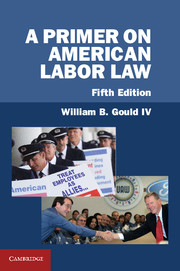Book contents
- Frontmatter
- Contents
- Preface to the Fifth Edition
- Preface to the Fourth Edition
- Preface to the Third Edition
- Preface to the Second Edition
- Preface to the First Edition
- 1 An Overview
- 2 Industrial Relations and Labor Law before Modern Legislation
- 3 The National Labor Relations Act and Related Labor Law
- 4 Unfair Labor Practices
- 5 Establishing the Collective Bargaining Relationship: Organization and Recognition
- 6 Economic Pressure and Bargaining Tactics in the Established Relationship
- 7 Remedies, the Labor Reform Bill of 1978, and the Employee Free Choice Bill of 2009
- 8 Dispute Resolution in the Established Relationship
- 9 The Duty of Fair Representation
- 10 The Public Sector
- 11 Public-Interest Labor Law
- 12 Conclusion
- Index
- References
9 - The Duty of Fair Representation
Published online by Cambridge University Press: 05 June 2013
- Frontmatter
- Contents
- Preface to the Fifth Edition
- Preface to the Fourth Edition
- Preface to the Third Edition
- Preface to the Second Edition
- Preface to the First Edition
- 1 An Overview
- 2 Industrial Relations and Labor Law before Modern Legislation
- 3 The National Labor Relations Act and Related Labor Law
- 4 Unfair Labor Practices
- 5 Establishing the Collective Bargaining Relationship: Organization and Recognition
- 6 Economic Pressure and Bargaining Tactics in the Established Relationship
- 7 Remedies, the Labor Reform Bill of 1978, and the Employee Free Choice Bill of 2009
- 8 Dispute Resolution in the Established Relationship
- 9 The Duty of Fair Representation
- 10 The Public Sector
- 11 Public-Interest Labor Law
- 12 Conclusion
- Index
- References
Summary
The duty of fair representation, under which a union as exclusive bargaining agent has an obligation to deal fairly on behalf of all of a bargaining unit’s employees (union and nonunion), has been inferred from the NLRA’s grant of authority to the union to negotiate on behalf of all workers. That other nations do not have the exclusivity concept and all its consequences makes this kind of litigation peculiar to the United States.
In 1944 the Supreme Court held that the failure of a union to meet its duty of fair representation constituted a violation of federal labor law, and the NLRB subsequently held that it constituted an unfair labor practice as well.
The duty of fair representation is ... akin to the duty owed by other fiduciaries to their beneficiaries ... some Members of the Court have analogized the duty a union owes to the employees it represents to the duty a trustee owes to trust beneficiaries others have likened the relationship between union and employee to that between attorney and client ... the fair representation duty also parallels the responsibilities of corporate officers and directors towards shareholders. Just as these fiduciaries owe their beneficiaries a duty of care as well as a duty of loyalty, a union owes employees a duty to represent them adequately as well as honestly and in good faith.
In Vaca v. Sipes the Court held that the federal courts as well as the Board had jurisdiction over duty-of-fair-representation cases. However, unless the collective bargaining agreement authorizes the individual to take his or her grievance to arbitration, the union maintains control of the grievance and may determine whether to initiate arbitration. The Court held that the individual employee has no “absolute right” to initiate arbitration and that the industrial self-government that had been created by the parties would be harmed by a contrary rule. At the same time the Court concluded that an employee could attack the union’s failure to process the grievance if its actions toward an employee in the bargaining unit were “arbitrary, discriminatory, or in bad faith.” It is difficult to determine what the Court meant by these words. Whether a union’s simple failure to process a grievance because it was lost or forgotten constitutes a failure to meet the duty of fair representation is unresolved,but it certainly presents a difficulty for the employee whose grievance is meritorious.
- Type
- Chapter
- Information
- A Primer on American Labor Law , pp. 299 - 326Publisher: Cambridge University PressPrint publication year: 2013



